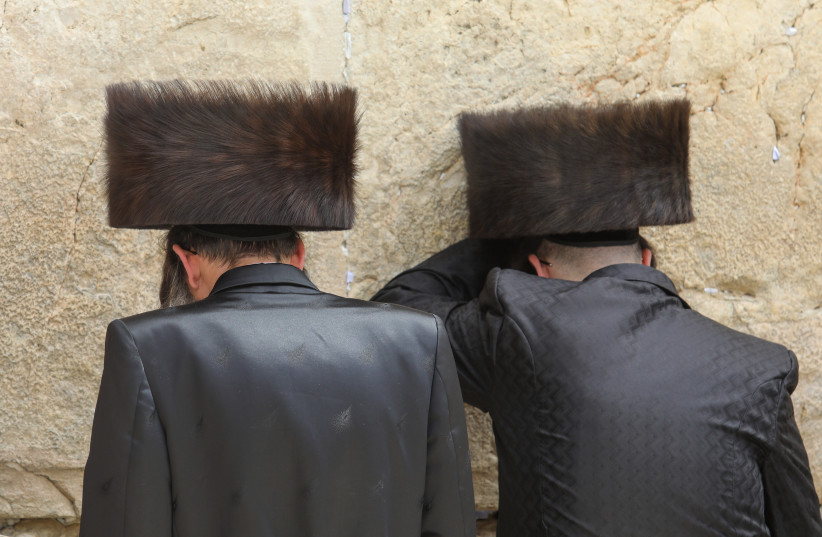Following early morning violence, by mid-day the atmosphere at the Western Wall plaza was calm, with family groups, tour groups, local Israelis and pilgrims filling the plaza on the first day of the Passover holiday, snapping photos and praying at the wall.
“We planned a family vacation in Jerusalem and we didn’t want the situation to deter us from our holiday,” said Tahg Adler, 45, from Modi’in, who had come to Jerusalem with his extended family including his four sons. “We felt safe coming here because of all the security. We keep our eyes open and are more on alert.”
About half-an-hour earlier, they had heard disturbances that sounded like shots on the Temple Mount, he said, but the police at the plaza had assured him that they were firecrackers.
“We are not stressed,” he said. “We are just more alert.”
His 15-year-old son Shai said he had been a bit scared when he heard the sounds from the Temple Mount but he felt more relaxed when they stopped.

“I am just glad to be out of school,” he said.
A few hours earlier, seven Egged bus passengers were lightly injured near Lion’s Gate when Palestinian rioters threw rocks at three buses heading to the Western Wall.
There were also clashes between police and Palestinian rioters on the Temple Mount as police cleared the way for Jewish visitors during the designated time this is permitted according to the status quo, and three Jewish worshipers were attacked by Palestinians on their way to the Western Wall. A police spokesman said suspects had been arrested in that incident, and 18 others were arrested for the stone throwing and riots on the mount. He said “hundreds” of police, including special forces and border police, had been deployed throughout the Old City and that “things are now quiet.”
Dolly Lesgold, a guide at the Western Wall Heritage Foundation said one of their guides who had been on one of the Egged buses was injured and was taken to hospital where he was still being treated. The tense situation had calmed down after about an hour, she said, and they were busy with tour groups going into the tunnels every 10 minutes.
The first day of Passover week, one of the three Jewish pilgrimage holidays, coincided with the celebration of Easter and the Orthodox Christian Palm Sunday, as well as the continuation of Ramadan. Visitors and pilgrims of all faiths walked through the city, which got more crowded as the day wore on, and different languages could be heard in the alleys of the Old City.
TENS OF thousands of people are expected over the holiday week as coronavirus restrictions have been lifted and both local and international visitors flock to the city.
Although Olga Manchik, 42, of Rishon Lezion admitted that she had been very scared of the security situation before coming to Jerusalem with her husband and two children, her friend Shlomit Katzav convinced her that anything can happen anywhere.
“I see that it is not so crowded here, so I am more relaxed,” she said, adding that they would be walking through the Old City shuk (market).
“There is so much security here,” said Katzav, 40, “and it is up to God to protect us.”
Theodora Dascalu, 81, a Romanian Orthodox Christian from Switzerland who had lived in a Jerusalem monastery 30 years ago, said she decided to come to Jerusalem for Easter after the travel restrictions had been lifted. When her travel companion came down with COVID, she did not let that deter her.
“I am not afraid of the security situation. God is with me. I love Jerusalem. I like the Jewish people. I like this wall,” she said, as she finished praying at the Western Wall. “It is a passion for me.”
Her family comes to Jerusalem twice a year for Succot and Passover, said Kasansh Kaye, 24, from Petah Tikva, and so they came this year, too.
“We see a lot of soldiers and security,” she said. “My mother was worried but she always worries.”
Coming down the Via Dolorosa near the Austrian Hostel, Tali Landau, 69, said he has been coming to the Old City every week for years. Even as a local Jerusalemite he still feels something special every time he comes.
Shopkeeper Fayez Dakkah, whose Old City Bazaar shop is just outside of the Church of the Holy Sepulchre, said that although there were more tourists in the city, it is still less than half the normal numbers. Even when there are clashes by the Temple Mount, it doesn’t affect business in the Christian Quarter, he said.
“For two years it was like a ghost town – and when the government decided to open the skies, psychologically we felt relief, feeling that things are getting back to normal. This is not like a normal Easter, but we are carefully optimistic,” he said.
But one Palestinian shopkeeper near the Jaffa Gate watched as a police patrol walked up the street.
“What do you think; people aren’t scared when they see all these armed police walking through like that?” he asked. “Do you think people want to come to a place where there are all the police like that?”
Outside the shuk at the Jaffa Gate, Matilda Salman, 30, stopped and watched the flow of visitors with her husband and three-year-old son, after attending Palm Sunday services at the Church of the Holy Sepulchre.
“It is very nice to see people on tour groups and people coming to worship and pray,” the Jerusalemite said. “It is also the Jewish Passover so it is a big ‘balagan’ (mess) but it is nice to see different people coming here. Each has his own purpose for coming to Jerusalem.
“If there are problems, it affects tourism,” she said. “We always hope that all can live here in peace. People don’t appreciate that we are living in a holy place.”
